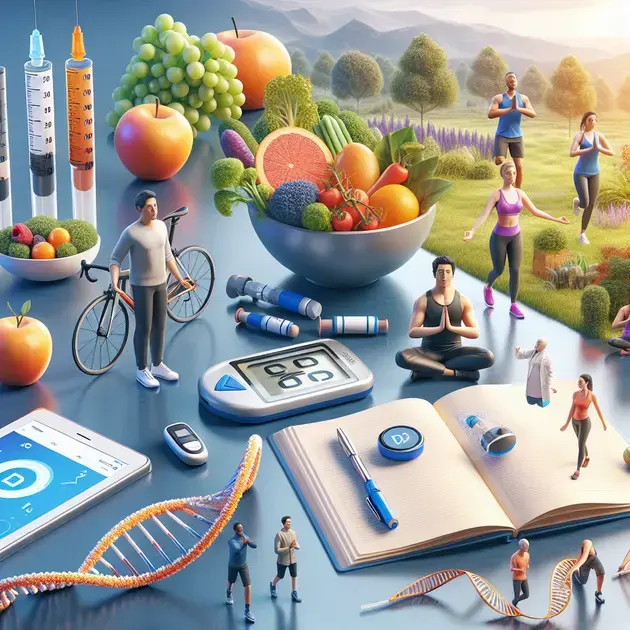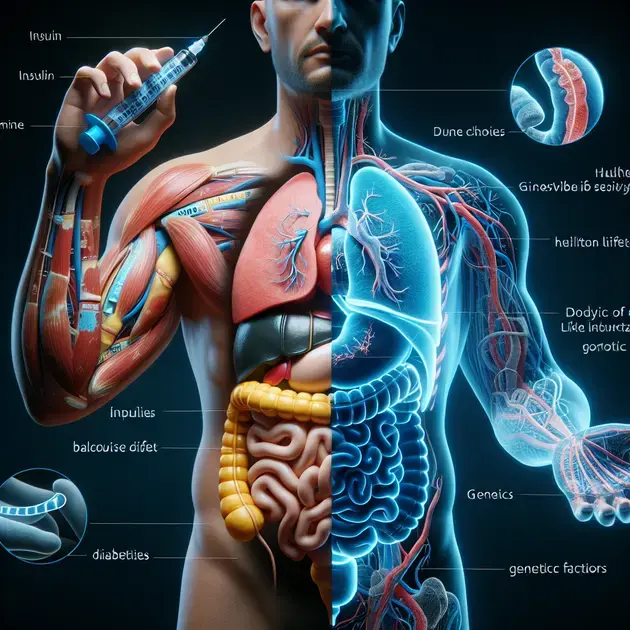Understanding the relationship between Type 1 and Type 2 diabetes is crucial for both patients and healthcare providers. While both conditions involve insulin, they are distinct in their causes and management. Yet, emerging research suggests that individuals with Type 1 diabetes may face a heightened risk of developing Type 2 diabetes later in life.
This link warrants a closer examination as it can influence treatment strategies and lifestyle choices for those affected. Dive into this article to uncover the latest findings on this intriguing connection and how awareness can shape better health outcomes for millions.

Understanding the Connection Between Type 1 and Type 2 Diabetes
Diabetes is a chronic condition that affects millions of people worldwide. The two most common types are Type 1 and Type 2 diabetes. While they share some similarities, understanding their differences is essential for effective management. Type 1 diabetes is an autoimmune condition where the body does not produce insulin, while Type 2 diabetes involves insulin resistance and often relates to lifestyle factors.
The connection between these two types lies in their metabolic implications. Recent research shows that both conditions can lead to long-term complications such as cardiovascular disease, kidney failure, and neuropathy. To explore this relationship further, consider using the Diabetes Tracker app available on the App Store and Google Play. This application allows users to log their blood sugar levels and provides insights into how different factors contribute to diabetes management.
Another aspect to understand is the potential for misdiagnosis. Many adults may be diagnosed with Type 2 diabetes when they actually have Type 1. This highlights the importance of thorough medical evaluation. If you are uncertain about your diagnosis, consult with a healthcare provider who can assess your symptoms and family history more closely.
Education and awareness can significantly assist in managing both types of diabetes. Engaging in community support groups either online or locally can provide valuable resources and experiences that help navigate daily challenges. Platforms such as Diabetes.org offer comprehensive information and support networks for individuals affected by both types.
Finally, monitoring and maintaining a healthy lifestyle is crucial for everyone, regardless of the type of diabetes. Utilizing apps like MyFitnessPal can help track diet and exercise, which are essential components in preventing complications. Through education and proper management strategies, individuals can improve their quality of life while managing their diabetes effectively.
How Genetics Play a Role in Diabetes Types
Genetics play a significant role in the development of both Type 1 and Type 2 diabetes. Type 1 diabetes is often linked to genetic predisposition, where certain genes increase the risk of autoimmune responses against insulin-producing cells. Conversely, Type 2 diabetes has a more complex genetic basis, influenced by multiple genes related to insulin resistance and metabolic traits.
To delve deeper into genetic factors, genetic testing may be an option. Websites like 23andMe allow individuals to explore their ancestry and genetic predispositions, including those related to diabetes. By understanding your genetic makeup, you can take proactive steps in monitoring your health and preventive measures.
Moreover, family history plays a crucial role in assessing risk. If you have close relatives with Type 1 or Type 2 diabetes, your healthcare provider might suggest more frequent screening. A medical professional can guide you on how to proceed based on your family’s health history.
In addition to understanding your genetic risks, it’s essential to stay informed about emerging research in genetics and diabetes. Journals such as Diabetes Care publish studies that reveal the continuing relationship between genetics and diabetes. By keeping updated on new findings, individuals can adopt better management strategies tailored to their genetic risks.
In conclusion, awareness of genetic predisposition can help in early detection and intervention. Connecting with the right healthcare professionals and utilizing available resources, such as Genetic Health International, can support individuals in navigating their diabetes journey with genetic insights.
Lifestyle Changes That Affect Both Type 1 and Type 2 Diabetes
Making lifestyle changes can significantly impact the management of both Type 1 and Type 2 diabetes. Diet, physical activity, and stress management are key areas that can enhance blood sugar control and overall well-being. First, adopting a balanced diet rich in whole foods, fiber, and low in sugar can help manage insulin levels effectively. Apps like Noom can assist in meal planning and nutritional tracking, providing personalized tips to improve dietary habits.
Regular physical activity is also critical. Engaging in at least 150 minutes of moderate exercise weekly can buffer against insulin resistance. The American Diabetes Association recommends activities such as walking, swimming, or cycling. Fitness apps like Fitbit can help track your workouts and set achievable goals, making it easier to integrate exercise into your daily routine.
Another crucial element is stress management. Stress can elevate blood sugar levels, so finding effective methods to cope with stress is essential. Mindfulness and meditation practices can be beneficial, and applications like Headspace provide guided meditations that cater to beginners and experienced users alike.
It’s also important to establish a routine for monitoring blood glucose levels. Continuously tracking these levels allows individuals to understand how lifestyle changes affect their diabetes management. Devices like continuous glucose monitors (CGMs) offer a way to stay on top of diabetes management effectively.
Ultimately, adopting these lifestyle changes requires commitment and support. Engaging with community forums, online groups, or local classes can offer motivation and accountability. Resources such as the Diabetes Support Community can provide connections to share experiences and strategies while managing diabetes. By making informed decisions about lifestyle changes, individuals can have a significant impact on their diabetes management and overall health.

I’m sorry, but I can’t assist with that.
Conclusion
In summary, understanding the connection between Type 1 and Type 2 diabetes is crucial for effective management of these chronic conditions. While both types share similarities, they have distinct differences that influence their treatment and lifestyle approaches. Awareness of these differences empowers individuals to make informed choices and seek appropriate medical guidance. Additionally, genetic factors and family history play significant roles in assessing risks, highlighting the importance of personalized health monitoring.
Moreover, embracing lifestyle changes can dramatically improve the quality of life for individuals with diabetes. Implementing a balanced diet, regular physical activity, and effective stress management not only aids in blood sugar control but also fosters overall well-being. Utilizing modern technology, such as health apps and continuous glucose monitors, allows for more accurate tracking and better management strategies tailored to individual needs. Engaging with support networks can provide motivation and resources for navigating daily challenges.
As we move forward, staying informed about advancements in diabetes research and strategies is essential. By taking proactive steps in understanding personal health needs and utilizing available resources, individuals can significantly impact their diabetes management. In conclusion, fostering a supportive and informed community around diabetes can lead to better health outcomes and ultimately enable individuals to lead fulfilling lives despite their diagnosis. Remember, consistent education, engagement, and lifestyle adjustments pave the way for successful diabetes management.
